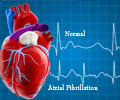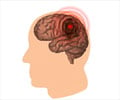Short episodes of irregular heart rhythm, which lasts for less than 20 seconds does not increase risk of stroke in people with pacemakers.

‘People with short episodes of irregular heart rhythm are not at a higer risk of stroke or other cardiovascular conditions. They do not need anti-coagulants or blood-thinners, which also cuts the risk of bleeding.’





As a result, guidelines recommend that patients with atrial fibrillation take anticoagulants, blood thinners that decrease the ability of the blood to clot, to reduce their stroke risk. However, it has been unclear whether "short" episodes (estimated as less than 20 seconds) also increase medical risks and warrant anticoagulants.Researchers analyzed 37,000 individual ECGs from 5,379 patients over 2 years enrolled in the RATE Registry, an ongoing study following patients with pacemakers or defibrillators that constantly monitor their heart rhythm. The study confirmed that long episodes of atrial fibrillation are associated with increased risk of stroke, heart failure, ER visit or hospitalization for an abnormal heart rhythm, or death.
In contrast, during the course of two years, patients experiencing only "short" episodes of atrial fibrillation were at no more risk of stroke or other cardiovascular complications than people without documented atrial fibrillation.
Over the two years of the study, researchers found more than 15,000 episodes of atrial fibrillation, with 94 patients being hospitalized for atrial fibrillation. A further 265 patients were hospitalized for heart failure and 47 patients were hospitalized for stroke. total of 359 patients died.
The results suggest that, in patients who only experience short episodes of atrial fibrillation, the risks of bleeding associated with taking anticoagulants outweighs the risk of stroke.
Advertisement
Other studies have shown that prolonged episodes of atrial fibrillation pose a risk, but what about short ones? The answer until this study was 'no one knows.' Now we have good solid data that if all you have is short episodes of atrial fibrillation, the risk is so low that it does not warrant anticoagulants.
Advertisement
Source-Medindia














